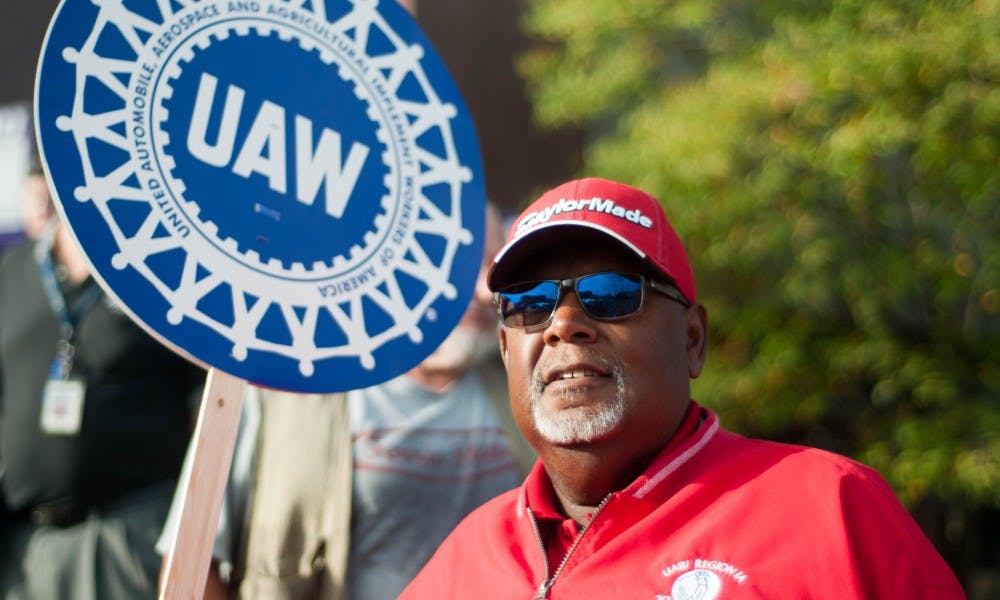State workers and union members rallied in front of the Capitol Commons Center where the Michigan Civil Service Commission held a meeting on the morning of Sept. 20.
The commission, consisting of four governor appointed persons, discussed the implementation of a new set of rules that would limit and regulate the collective bargaining rights of state workers.
President of UAW Local 6000 Ed Mitchell was once a teacher out of W.J. Maxey Boys Training School, which closed down a few years ago. He worries the commission will limit the power and protection unions have from the government.
“The rules that are being proposed take us back to a time before the unions actually came in,” Mitchell said. “I hired (into my teacher position) over 40 years ago. When I hired in, you had to have friends to get promotions, to get good assignments. There was a lot of nepotism, there was a lot of favoritism. And then when the unions came in, we brought in a whole new era of fairness and everything was based on seniority.”
Several speakers from UAW Local 6000, a union representing employees in Michigan's state government, urged the commission not to pass the proposals. But the Michigan Civil Service Commission voted for controlling and limiting the ability to bargain for various job protections.
“These are the workers that have gone on furlough,” Michigan House Democratic Leader Sam Singh said. “These are state workers that during tough times they gave up pay, and now that times are better we should actually be rewarding them for their service. Unfortunately, the commission is not looking to help and support them.”
Dannial Rogers, a state employee represented by UAW Local 6000, works for the Michigan Department of Health and Human Services. When establishing a contract, she sits with the employer and negotiates for adequate working conditions and protections, but according to Rogers, the Michigan Civil Service Commission aims to make their decisions for them.
“For some reason the Civil Service Commission has decided, ‘well we need to change things just in case.'"Rogers said. "Just in case of what? Just in case you feel the need to do whatever you want to do whenever you want to do it? We’re doing everything from taking care of people in mental health facilities to taking care of vulnerable children to parole and probation. The work that we do touches every single Michigander's life. How we’re treated, how we’re able to take care of ourselves and do our jobs, directly affects everybody else.”
According to Rogers, the Michigan Civil Service Commission was also looking to make certain things prohibited subjects of bargaining, such as overtime, which is normally discussed on a contract between employee and employer. Rogers also mentions the implementation of the Rule of General Applicability, which allows the commission to alter parts of a union contract whenever if necessary.
“The Civil Service Commission was set up so that we can keep cronyism, nepotism and politics in general out of setting the rules for state employment. And in that set up, we can unionize, we can sit with the employer and decide what’s best for the employer and for the employees so that we’re treating fairly while still being able to do the business to run the state,” Rogers said. “The rules that they are proposing changing today changes all that.”
Multiple campaign groups attended the rally as well. Among these groups were petitioners for Democratic candidates Gretchen Whitmer and Shri Thanedar, both pro-union candidates in the 2018 Michigan Gubernatorial Election. Multiple chants were heard at the rally including, “Governor Snyder’s got to go” and “Governor Snyder, shame on you”.
“I’m hoping to see a new governor that is more sympathetic to the workers,” Mitchell said. “We’re the ones that service the people of the state of Michigan. … We wouldn’t be working for the state if we didn’t have a concern for the people of the state of Michigan.”
Mitchell said that there were eight full buses of UAW members arriving at the rally from all over the state, as well as hundreds of members driving in to represent and support.
“When it comes to the Civil Service Commission, the bargaining process is always difficult, but it is effective,” Rogers said. “They’re trying to change the venue in which we could even do that. They’re trying to change the playing field that we have, to create and affect those changes, when historically the playing field we have works. It takes time, sometimes it’s frustrating, but it does work. There’s no need to change it.”
Support student media!
Please consider donating to The State News and help fund the future of journalism.
Discussion
Share and discuss “Workers rally in Lansing against collective bargaining changes” on social media.







